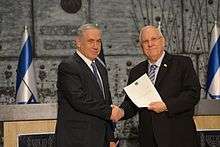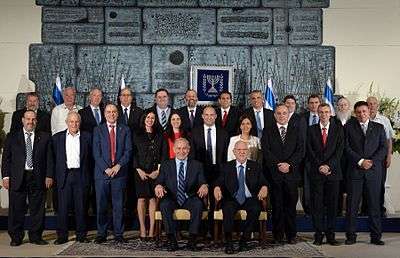Thirty-fourth government of Israel
| Fourth Netanyahu Cabinet | |
|---|---|
|
34th cabinet of Israel | |
| Incumbent | |
 | |
| Date formed | 14 May 2015 |
| People and organisations | |
| Head of government | Benjamin Netanyahu |
| Head of state | Reuven Rivlin |
| Number of ministers | 21 |
| Member parties |
Likud The Jewish Home Kulanu Shas United Torah Judaism Yisrael Beiteinu |
| Status in legislature | Coalition |
| Opposition leader | Isaac Herzog |
| History | |
| Election(s) | 2015 Knesset election |
| Legislature term(s) | 20th Knesset |
| Predecessor | 33rd Cabinet |
| Successor | 35th Cabinet |
 |
| This article is part of a series on the politics and government of Israel |
|
Legislature |
The thirty-fourth government of Israel, also known as the Fourth Netanyahu Government, [1] is the current government of Israel, headed by Prime Minister Benjamin Netanyahu. It was formed after the March 2015 Knesset elections. The coalition that makes up the government, consisting of the parties Likud, United Torah Judaism, Shas, Kulanu and the Jewish Home, was submitted to the President of Israel just before the deadline on 6 May 2015. The government ministers were introduced, approved by the Knesset and sworn in on 14 May. The government deputy ministers were sworn in on 19 May.
Between them, the parties hold 61 of the 120 seats in the Knesset. The elections that led to the formation of the government were a result of events on 2 December 2014, when Netanyahu dismissed two of his ministers whose parties' members subsequently resigned from the 33rd government of Israel, dissolving the government ahead of schedule.
Policy guidelines
The policy guidelines for the 34th government include but are not limited to:[2]
- Strengthening the rule of law
- Reducing the cost of living
- Increasing competition, especially in the financial sector, and granting easier access to credit for small and medium businesses
- Integrating disabled persons into society, in providing education and employment aid
- Advancing the peace process with the Palestinians and other neighbors while keeping Israel's national interests
Coalition agreements

Terms of coalition agreements are considered binding law in Israel.[3] As such, parties must adhere to the agreements made with the Prime Minister when the coalition was formed.
Changes to the responsibilities of official positions include the relinquishment of the Justice Minister's ability to appoint judges to religious courts. Also, the Religious Affairs Minister will not have control over affairs connected to conversion to Judaism; that will be under the purview of the Prime Minister's office.
Kulanu
Kulanu agreed to support the implementation of the Norwegian Law, allowing members of the Knesset to exit the Knesset upon receiving a post in the cabinet.[4]
Likud agreed to raise the salary of soldiers, give unemployment insurance to self-employed workers and set a biennial budget by October 2015.[5]
Kulanu is also permitted to vote against the coalition if it disagrees with legislation that would reform the Israeli Supreme Court.
The Jewish Home
The agreement includes an increase of NIS 630 million ($163.4 million) for the education budget, an allocation of NIS 1 billion ($259 million) to raise soldiers' pay during their third year of service, a budget increase for Ariel University, which is in the West Bank, and support for the so-called NGO bill.[6]
The agreement also stipulates that all obligations and commitments made to increase Haredi institutions will have to come from the Finance Ministry and not the Education Ministry.
Future changes
Members of the Likud party anticipate possible additions to the coalition, including Likud member Gilad Erdan, who did not accept the ministerial position that was offered to him by Netanyahu, and Avigdor Lieberman, whose Yisrael Beitenu party decided not to join the coalition. Additionally, Likud member Tzahi Hanegbi, who had to settle for a Knesset committee chairmanship, is expected to gain a ministerial position after one year, when he switches places with Ofir Akunis.[7]
Cabinet members

Deri resigned his post as Minister of the Economy reportedly over an unpopular gas monopoly deal. Netanyahu took over the portfolio and promised to speed up the deal.[8]
Deputy ministers
Security cabinet
See also Security Cabinet of Israel.
Committee chairs
| Committee | Chairman | Party |
|---|---|---|
| Economic Affairs Committee | Eitan Cabel | Zionist Union |
| Education, Culture, and Sports Committee | Ya'akov Margi | Shas |
| Ethics Committee | Yitzhak Vaknin | Shas |
| Finance Committee | Moshe Gafni | United Torah Judaism |
| Foreign Affairs and Defense Committee | Tzachi Hanegbi | Likud |
| House Committee | David Bitan | Likud |
| Committee for Immigration, Absorption and Diaspora Affairs | Avraham Neguise | Likud |
| Internal Affairs and Environment Committee | Dudu Amsalem | Likud |
| Labor, Welfare and Health Committee | Eli Alaluf | Kulanu |
| Constitution, Law and Justice Committee | Nissan Slomiansky | The Jewish Home |
| Science and Technology Committee | Uri Maklev | United Torah Judaism |
| State Control Committee | Karin Elharar | Yesh Atid |
| Committee on the Status of Women and Gender Equality | Aida Touma-Suleiman | Joint List |
| Special Committee for Discussion of the Public Broadcast Bill 2015 | Stav Shaffir | Zionist Union |
| Special Committee for Public Petitions | Yisrael Eichler | United Torah Judaism |
| Special Committee for the Rights of the Child | Yifat Shasha-Biton | Kulanu |
| Special Committee for the Transparency and Accessibility of Government Information | Stav Shaffir | Zionist Union |
| Special Committee on Drug and Alcohol Abuse | Tamar Zandberg | Meretz |
| Special Committee to Discuss the National Authority for Urban Renewal Bill | Eli Cohen | Kulanu |
| Source: Knesset | ||
Government agencies and special committees
| Agency / Committee | Chairman | Party |
|---|---|---|
| Israel Land Administration | Yoav Galant | Kulanu |
| World Zionist Organization’s Settlement Division | Uri Ariel | The Jewish Home[6] |
| Israel Atomic Energy Commission | Yuval Steinitz | Likud |
References
- ↑ "ממשלת נתניהו השלישית: מפלגת השלטון הופכת". NRG. Retrieved 17 February 2015.
- ↑ Tuval, Uri (May 13, 2015). "Promise to Keep Status of High Court Removed from Government Policy Guideline Document". Calcalist (in Hebrew). Retrieved May 14, 2015.
- ↑ "Bennett rejects US comments on 'Jewish state' bill". Times of Israel.
the present government’s coalition agreement, which has the binding legal status of a contract
- ↑ "Contents of coalition agreements with UTJ, Kulanu revealed". ynet.
- ↑ "Securing first partners, Likud inks coalition deals with Kulanu, UTJ". The Times of Israel.
- 1 2 "Jewish Home makes it official with Likud deal". The Times of Israel.
- ↑ http://www.haaretz.com/news/israel/1.656887
- ↑ ‘Struggle over democracy’: Israelis protest Netanyahu’s gas deal with US energy giant Russia Today, 8 November 2015
External links
| Wikimedia Commons has media related to Thirty-fourth government of Israel. |
- Thirty-fourth government of Israel at the Knesset website
- Thirty-fourth government of Israel at the Israel Ministry of Foreign Affairs website